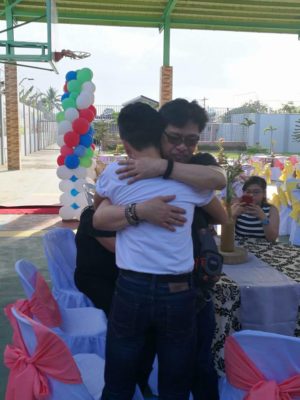18 ‘graduate’ from Cavite drug rehab center

FIRST BATCH Total Care Inc. Village holds its first “graduation” of drug dependents in Amadeo town, Cavite province, on May 9. —PHOTOS BY POCHOLO CONCEPCION
May 9 was a special day at Total Care Inc. (TCI) Village, a new rehabilitation center in Amadeo town, Cavite province, that bills itself as “a healing place for persons with addiction and behavioral issues.”
The occasion was the “graduation” of the first batch of drug dependents after they went through a yearlong recovery program at the center.
There were 18 in the graduating group.
A few hours before the ceremony, a touching scene unfolded: a father hugged his son tightly, and then talked to him softly as the mother and a sibling looked on.
The father, a seafarer, was visiting his son at TCI Village during his vacation. It was the first time they saw each other since the son, who’s 18, entered TCI for rehab a few months ago.
Article continues after this advertisementThe boy had behavioral problems, said the father, who disclosed that friends, including a young actor, exploited his son, who couldn’t resist peer pressure.
Article continues after this advertisementHis son was influenced into taking ecstasy last year, he said.
The boy became rebellious and was always out, coming home only in the wee hours, according to the mother, who said that she and her husband had decided to seek help at TCI.
The son looked fine and happy to be with his family.
No country exempted
Inside TCI’s Graduates Hall, which looks like a vacation house a few meters from the main center, TCI founders Jun Tan, Joel Chavez and Joey Ibañez chatted and exchanged banter with friends and guests.
Joining them was the guest speaker — Tay Bian How, the director of Emeritus Addiction Studies, a Malaysia-based organization that provides professional education, training and consultative services in addiction prevention and treatment of substance use disorders.
Emeritus and TCI have partnered to assist each other in their mission and advocacy.
“No country is exempt from the problem of addiction and substance use disorders,” said Tay, who had also headed the training of a professional workforce in addiction treatment under the Colombo Plan, a cooperative venture for the economic and social advancement of Asia-Pacific countries.
“Addiction is a physical and mental problem,” Tay said. “The body may be rid of drugs, but the mind can remain addicted. Recovery capital is important—what the person has, internally or physically, or whatever influences from the family or community, to lead a new life. A person has [to fulfill] various needs… something he or she likes, instead of drugs. A job is one thing. Sense of belonging is another. There are several factors, but my point, and the one I’m advocating, is education.”

TOUCHING SCENE A seafarer sees his 18-year-old son, one of the “graduates,” for the first time since he entered the center a few months ago.
Tay, who came from a poor family, said his mother emphasized the importance of education. “After 12 years of school, I had to work. When I worked, I also studied for 10 more years. Education helped change my life. I did not choose this job. In Malaysia I was trained to be a diplomat, to work in an embassy. But I was posted in internal security related to drugs. The first two years I was miserable, and then things got interesting. I kept learning.”
Support group
After Mass and dinner, the graduation ceremony began. Loud cheers greeted the graduates, who walked to their seats in formal wear—the men mostly in barong Tagalog, and the women in gowns.
They spoke briefly about themselves, the suffering they underwent, mostly as substance users, and what they had learned on the recovery program at TCI.
Tan, Chavez and Ibañez — the first letters of their surnames also forming the TCI acronym — hopped from table to table, congratulating the families of the graduates, and posing for pictures with them.
Later, in an unprepared speech, Ibañez told the graduates never to hesitate to return to TCI whenever they wanted or needed to. “We are here as your support group. The door is always open.”
One of the graduates, a 29-year-old who was hooked on crystal meth (“shabu”) for 14 years, said recovery was his priority. He had had many things on his mind, many plans that made him fall by the wayside due to confusion, he said.
“Recovery first, the rest will follow,” he said, adding that he had started working as a member of the program staff at TCI.
‘It’s like a mirror’
Another graduate, a 50-year-old who had used alcohol and multiple drugs, said he had come from a rehab program in another center, graduated and then relapsed.
Half of the program he took at TCI was spent working as program staff. “Working with . . . other people in recovery is helping me out,” he said. “It’s like a mirror — I see myself in them. I saw what I did wrong in the past.”
He plans to stay in TCI till December and then go back to the United States, where he had lived. “But whenever I’m in the Philippines, I will help out. I need to come back to TCI. I need to connect with our support group,” he said.
A female graduate, who used shabu for 16 years, said she learned humility and forgiveness—“to forgive my past.”
“I plan to give back to TCI, to help others, because I’m working here now,” the 31-year-old said.
The life she had led as an addict made her arrogant and sinful, she recalled. At TCI, she said, she developed the discipline of following and respecting elders, doing acts of kindness, and appreciating the goodness of people.
As for the rest, wherever their plans take them, the text from 2 Corinthians 5:17 posted just below the stage should serve as an inspiring reminder: “The old is gone, the new has come, I am alive.”